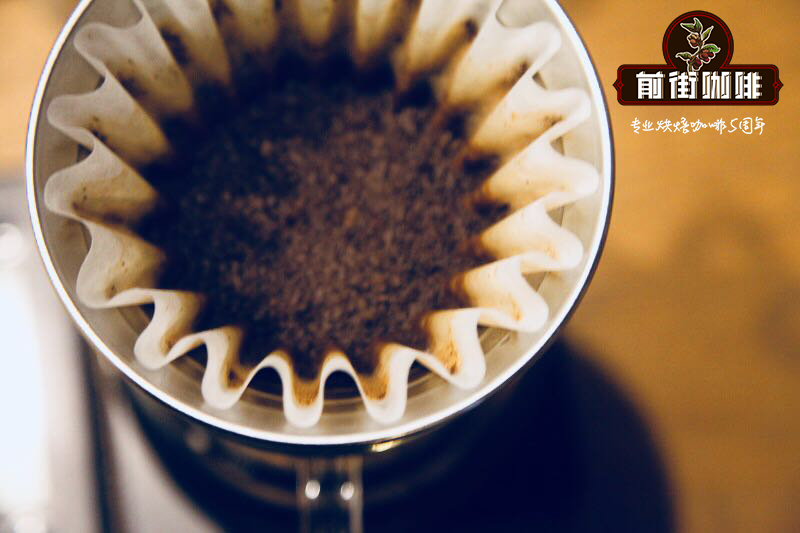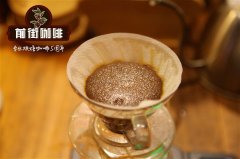"Coffee equation" perfect coffee brewing method _ 4 conditions for making good coffee

Professional coffee knowledge exchange more coffee bean information please follow the coffee workshop (Wechat official account cafe_style)
Does ● have a perfect way to make coffee?
According to Mr Danbu, the Royal Chemical Society (Royal Society of Chemistry), made up of people dedicated to chemical science, published the perfect method of brewing black tea in 2003.
"the book 'scientifically' shows the temperature, time, water composition and other conditions of brewing black tea. If it can be faithfully reproduced, delicious black tea can be brewed. The book fully reflects the persistence, scientific exploration and playfulness with British characteristics, and has become a useful source of information for black tea lovers. " (Dan)
There are so many guides like this in Japan, not only black tea, but also Japanese tea, Chinese tea and, of course, coffee brewing methods and other explanatory books. This guidebook is so full of streets and lanes that you don't even know how to choose. However, I am sure that there is no so-called "perfect brewing method" for coffee, and Mr. Danbu agrees with me:
"making coffee tastes good is far more difficult than black tea, and you can't use the word perfect. The reason is that coffee contains much more 'impure substances' that cause miscellaneous flavor than black tea. Therefore, to get rid of those impure substances requires superb extraction technology. "
So that's why there is no absolutely perfect way to make coffee in the coffee world. I totally agree with you.
If I say that black tea is much less difficult to extract than coffee, black tea fans may be very angry. This is because the ingredients that cause the miscellaneous flavor of black tea are already few. If you want to brew black tea well, you only need to do a good job of how to make the aroma ingredients "strong / weak".
But coffee is different. When brewing coffee, "while properly extracting the delicious ingredients, we should also do not extract the bad ingredients" and carry out self-contradictory work at the same time. Therefore, it is much more difficult than black tea.
The favored era of ● extraction masters
Forty years ago, when I started the coffee industry, extraction was more important than baking. As long as the extraction technology is good, no matter how bad the quality of raw beans and how rough the roasting technology is, there is always a way (no, absolutely) to brew delicious coffee. This "extraction myth" hangs over the coffee industry. This is the same as the "idealism" that believes that the divine wind will come. In retrospect, I can't help but feel a lot of emotion. Why on earth is this craze of "extractive supremacy"?
Professional coffee magazines have a lot of reports about extraction, and the cover is all about extraction celebrities. It is a pity that a large number of theories can not be introduced to you here. The bizarre extraction technology that the Japanese thought deeply about was like an "exhibition" at that time.
However, it is now believed that "delicious coffee is 8% raw beans and 2% roasted". Although we do not know the basis for this proportion, it seems sad to say that "extraction technology" and "extraction celebrities" have been left behind by the public and almost forgotten.
When boutique coffee first appeared, the slogan "from seed to cup (From Seed to Cup)" was no longer just the exclusive patent of boutique coffee. No matter what grade of coffee it is, if what is poured into the cup is rough, how high-end the theory is meaningless. If it ends well, everything will be fine. Never slack off until the best liquid is injected into the cup.
Whether it's baking, grinding or extraction, I will set priorities in each process. This is because all the links are organically linked, no matter which link is missing or scrawled, all efforts will be ruined in vain.
Four conditions for ● to make "good coffee"
In the old book "Fine Coffee Collection", it was also mentioned that it takes a number of conditions to brew "delicious coffee". Before explaining this, please recall the previous remarks about "good coffee" and "bad coffee". If you want to make "good coffee", you need to meet the following four conditions.
High quality raw beans of ① flawless beans
② 's freshly baked coffee
③ 's freshly ground coffee
④ just made the coffee.
If we sum up the above four points, it is "the right roasting of the high-quality raw beans without defects, the proper grinding and extraction of coffee when the roasted beans are fresh", which is what I call "good coffee". I try to avoid using the words "good" and "bad" as much as possible. This is because I think "delicious" and "bad" is, after all, a matter of individual preference, which cannot be discussed objectively.
I hope members can make it clear that when I use the word "delicious", it is the "delicious" when providing "good coffee". It does not refer to the "delicious" which bypasses the above four conditions and simply stays in the area of personal hobby.
The taste of coffee is always unstable and shaky. Because it is a crop, there is not only the quality of the harvest, but also the deviation that occurs in the refining stage. In addition, baking is not always stable, and grinding and extraction are not fixed in one place. Some people will use this subtle deviation as an excuse to say, "because it is a crop, there is no way to change the taste," in order to defend the guest's complaint, but I think if you think you are a coffee professional, we should correct this subtle deviation and make a fixed taste no matter under what conditions. Professionals must be able to provide "taste reproducibility" of the same taste, not an one-shot deal.
●, if the water temperature rises, the bitterness will also increase.
If you follow the practice of your own store to arrange the process of "from seed to cup", it is:
Aroma characteristics of ① raw bean
Hand selection of ② raw beans (the first time)
③ baking
Hand selection of ④ baked beans (the first time)
Preservation and management of ⑤ baked beans
⑥ blends mixed coffee beans (mixed)
⑦ grinding
⑧ extraction.
What does the order of ①-⑧ mean? As I said earlier, all the processes before pouring the cup are closely related, and there can be no deficiency in any link.
Because we are not gods, we cannot be perfect. There is bound to be a mistake somewhere. For example, when hand-selected carelessly, raw beans will be mixed with a lot of unripe beans and fermented beans. Failed to stop baking at the scheduled time to stop baking, resulting in excessive baking. Wrong grinding scale, resulting in grinding too fine clogging drip filter and so on.
There are small principles here.
[one] "errors in the previous process can only be made up for in the next process." For example, what should have stopped in deep city baking (Full City Roast) has been put off to the next stage of French baking (French Roast). Although it is only over-roasted for tens of seconds, the difference in taste will be very obvious. Because excessive roasting will make the bitter taste strong. Can you find a way to correct it?
Remediation can only be done on the ⑦⑧ process. For example, French-roasted coffee beans are ground a little thicker in the ⑦ stage. There is a rule in the mesh of the filter powder, that is, the finer the grinding, the stronger the bitterness, the thicker the grinding, the less bitterness, and the lighter the taste. The finer the French roasted coffee beans are ground, the more bitter the taste will become.
Then in the ⑧ stage, the water temperature should be slightly lowered and the extraction amount should be slightly increased. These practices follow the rule that "bitterness increases with the increase of water temperature (= acidity weakens), bitterness weakens with the decrease of water temperature (= acidity)", bitterness weakens with the increase of extraction amount (= acidity increases), and bitterness increases with the decrease of extraction volume (= acidity weakens). "
To sum up, "grind the French-baked coffee beans a little thicker and fully extract them with a lower water temperature." The intention is to bring the aroma of coffee closer to the target flavor of deep city baking, but this is always an emergency measure and cannot boil 100% of the target flavor. As a result, there is a principle of approximate defense.
[2] "if you only fix it in the next process, it will not offset the error of the previous process."
Once there is a "deviation" in one process, no matter what kind of correction is made in the next process, it will be invalid. It's okay if you bake coffee beans for one person to drink. If the misbaked beans are in units of 10kg, you will need to take pains to correct them in ⑦ or ⑧ until all the baked beans are processed. In short, the lesson it taught us is that no matter which process must be calm and not to be underestimated.
The coffee just baked by ● is not delicious.
Let's get back to the previous topic. Before the "extraction" process, it is the "grinding" process. We've got to the point. However, I still hope that you can review it again and pay attention to item ②-④ of the four conditions for making "good coffee" mentioned above.
When making buckwheat noodles, "just ground, just rolled, just cooked" is the condition of delicious soba noodles. The same is true of rice. The freshly milled rice is the most fragrant. This is because whether soba noodles or rice, it is easy to lose its flavor when it begins to oxidize at the moment of grinding noodles or removing rice husks and chaff.
The same is true of coffee. "freshly roasted, freshly ground, freshly brewed" is the key to making delicious coffee. However, to be exact, the "freshly baked" ones that have just been taken from the inner pot are not delicious. Whether it's hand-net baking or any other way, if you've baked it yourself, you should know that freshly roasted coffee beans don't taste even if they are "freshly ground and freshly boiled".
This is because the taste is not extracted. It is true that if the aroma is good, it is worth drinking, but we can't taste the taste. I often use the expression "coffee beans explode". In fact, if freshly roasted beans are extracted by dripping and other methods, the coffee powder will "explode" and either the surface of the powder will crack or blow like a crater, making it difficult to form a permeable layer.
Mr. Danbu, who baked himself, felt the same way. He said: "the proper term should be 'lack of stability'." The taste is also very light. The reason is carbon dioxide. Raw beans that have just been baked produce a lot of carbon dioxide. Therefore, the taste tends to be sour, and because the content of carbon dioxide is not fixed, the taste is difficult to predict. In my experience, coffee made from coffee beans roasted for 3 days is the freshest and most stable. "
Key points of ● Grinding and baking Bean
After roasting, coffee will release aroma, on the other hand, the ingredients will gradually deteriorate due to oxidation. After grinding into powder, the overall surface area will increase dozens of times, the contact area with air will significantly increase, and the speed of deterioration is incomparable to that of raw beans. Therefore, it is best to grind when it is about to be cooked.
If the production of carbon dioxide is stable and the baked beans are stable, then there is the question of what kind of grinder to use and how to grind. A famous coffee master once said that coffee beans should be roasted correctly, whether with a hammer or a hammering bowl, any form of grinding can make good coffee, which is only half true. After being roasted correctly, high-quality coffee beans are generally delicious no matter what form they are ground and what tools are used to extract them.
However, this book is not a book of interest. It is a book that professionals can also use for reference. Therefore, even if grinding with a small hammer, how much effort it takes, how much time it takes, to what extent it is ground, what kind of hammer is used, etc., all the conditions of the experiment should be clearly shown in great detail. In this way, we come to the conclusion that bean grinders with better performance than hammers and hammers are the most suitable.
Although it is still a review of the old work, the key points when grinding with a bean mill are summarized as follows:
① grinding degree (particle size) should be uniform
Avoid friction heat during ② grinding
Avoid producing fine powder during ③ grinding
④ selects the degree of grinding suitable for extraction.
The word "uniform" appears in ①. No matter it is baking, grinding or extraction, there must be no "uneven". Non-uniformity will cause "disunity" of taste. No matter which step process, I always remember to pursue uniformity. Minimize unevenness. This is to end up with a cup of coffee with no miscellaneous flavor, uniform quality and balanced taste.
The ② point is the problem of "friction heat caused by grinding beans". If the excess calories are generated, it will aggravate the oxidation of coffee ingredients and lead to the deterioration of taste. The friction heat produced by buckwheat during grinding is also a common problem. Coffee differs from buckwheat and wheat in that coffee beans become "hard and brittle" when roasted. As a result, coffee beans can be ground more easily and produce less heat. In spite of this, the problem of friction heat will occur when using commercial bean grinders for continuous grinding. Try to use utensils that can avoid friction heat, at which point coffee and buckwheat are common.
The ③ point is that the problem of fine powder is more troublesome than friction heat. If mixed with a large amount of fine powder, it will cause excessive grinding and dissolve unpleasant astringency and other miscellaneous flavors. If you want to avoid producing fine powder, the most important thing is to choose a bean grinder that will not produce fine powder. Or use a tea filter to brush off the fine powder and silver skin together. It is also important to carefully clean the bean grinder and brush off the fine powder with a brush.
The ④ point is the problem of grinding degree suitable for extraction, which is taken for granted. If the filter paper dripping method is used to extract the ultra-fine grinding powder used to make espresso, I am afraid the holes of the filter paper will be plugged, the so-called "retention" phenomenon will occur, making it difficult for water to pass through, and the extraction time will be lengthened. Eventually lead to excessive extraction.
Each extraction apparatus has a grinding method of coffee powder suitable for the apparatus. Figure 24 shows the match between the strainer and the extraction method of coffee powder.
END
Important Notice :
前街咖啡 FrontStreet Coffee has moved to new addredd:
FrontStreet Coffee Address: 315,Donghua East Road,GuangZhou
Tel:020 38364473
- Prev

What are the methods of brewing coffee _ Coffee tutorial _ commonly used methods of brewing coffee powder
Professional coffee knowledge exchange more coffee bean information please follow the coffee workshop (Wechat official account cafe_style) flannel filter coffee brewing method flannel filter brewing-to maximize the flavor of coffee brewed with flannel filter brewing coffee, the most mellow and delicious. However, special attention should be paid to the arrangement and storage of the filter, otherwise the taste of the coffee will be low. 03 steam addition
- Next

How to brew pure coffee powder _ six methods of brewing pure coffee powder _ how to brew instant coffee
Professional coffee knowledge exchange more coffee bean information Please follow the coffee workshop (Wechat official account cafe_style) Coffee industry has a variety of coffee brewing methods, not to say which is the best, everyone has their own preferences. Unlike tea or cocoa, coffee allows everyone to brew it in their own unique way. But any method, the basic principles used
Related
- Beginners will see the "Coffee pull flower" guide!
- What is the difference between ice blog purified milk and ordinary milk coffee?
- Why is the Philippines the largest producer of crops in Liberia?
- For coffee extraction, should the fine powder be retained?
- How does extracted espresso fill pressed powder? How much strength does it take to press the powder?
- How to make jasmine cold extract coffee? Is the jasmine + latte good?
- Will this little toy really make the coffee taste better? How does Lily Drip affect coffee extraction?
- Will the action of slapping the filter cup also affect coffee extraction?
- What's the difference between powder-to-water ratio and powder-to-liquid ratio?
- What is the Ethiopian local species? What does it have to do with Heirloom native species?

